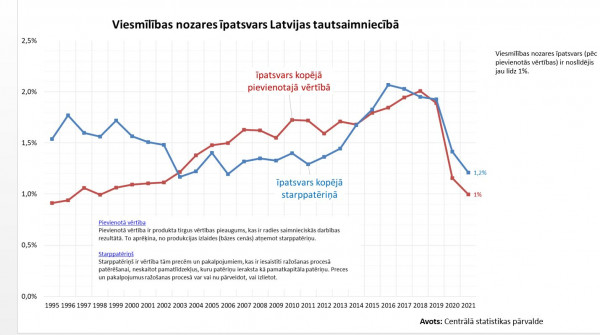LRA President Jānis Jenzis: Tourism and restaurants are the first things people start saving money on. We won't have an easy autumn

A conversation with Jānis Jenzis, President of the Latvian Restaurant Association.
On June 15, the Latvian Restaurant Association held a general meeting where you presented your vision of what has been done and what still needs to be done in the sector. The association looked back at the past years of Covid and discussed the challenges for this autumn. What are the conclusions?
I really don’t want to cry about it. I guess other sectors are fed up with us, because other sectors are also affected by the same bad phenomena as us. It seemed that we would be able to breathe easier on April 1, when the restrictions were lifted, but on February 24, the war in Ukraine started.
This has a huge impact on the segment of our business that is related to organized tourism, to tourist groups, both leisure and business tourists. In March, an avalanche of cancellations of tourist groups started. Tourists from the West and the rest of the world felt that the war was too close to Latvia and that it would be dangerous to stay here.
But there is individual tourism, foreigners have been seen in Riga and Latvia, colleagues are working.
There is a labor shortage in the catering industry at the moment - both skilled and unskilled workers are in short supply. Very good cooks have retrained during the pandemic and are doing other jobs, fearing a new wave of Covid in the autumn, uncertainty and instability. Many have gone abroad because there were fewer and more temporary restrictions, fewer vaccination requirements.
In inflation, all resources become more expensive for the entrepreneur, and labor becomes more expensive too. Of course, I am glad that good chefs are paid higher wages that are more competitive in Europe. But it is not possible to increase prices in catering establishments rapidly, because people's purchasing power is not growing as fast, and there are few tourists. Energy, fuel and food costs are rising much faster. Some colleagues find it possible to increase prices, but it is not always possible. Most caterers are now trying desperately to stay afloat, to keep their businesses going.

€20 can no longer even buy you 10 liters of fuel. People will travel anyway, but they won't travel far. To what extent will this affect campsites, restaurants and cafés in different cities?
There could be a study on this... But it is clear that it will and does affect it.
Fuel prices have gone up wildly and people can no longer afford to travel as much as they used to. Food prices are also rising, so people dine at home more than in restaurants. Tourism and restaurants are the first sectors people start cutting back on. Maybe the beauty and exercise sectors are suffering less, because people still need a haircut and want to be fit.
Hospitality was over 2% of the total economy in 2016, but is now less than 1%. That's a big drop...
Yes, it is. It was 2% of GDP, now it is 1%. However, it should be borne in mind that the hospitality sector is closely linked to and influences many other sectors - tourism, transport, trade.
But in the autumn, an even bigger fall is looming... The war in Ukraine, the crop failures in South America and the US promise a global food crisis.
Can the Latvian restaurant business solve the global food crisis?
It can't solve the crisis. But maybe restaurants can give free soup to the needy in autumn?
I guess it will be an acute problem. Recently, journalists from the television program “Bez tabu” interviewed me about a viewer's report that he saw an elderly couple in a hospital canteen splitting one bowl of soup between both of them. And the question was whether the catering companies were overcharging. I had to tell him that there is a price mechanism for soup, which includes the price of food, utilities, rent, depreciation of equipment, labor and value added taxes. So it is not as if catering companies are charging exorbitant prices just so that pensioners cannot afford vegetable soup. But it is true that the most vulnerable segments of society, pensioners, large families, low-wage earners, suffer the most from inflation. When the war in Ukraine broke out, I was tempted to say that the Covid pandemic would seem like small potatoes compared with the next crisis. Indeed, the food crisis will hit Europe and Latvia too, and prices will be much higher.
What are the restaurant and hospitality industry's recommendations to mitigate the crisis?
When the energy crisis started, we took the Polish example and reduced VAT on food. I understand that the country needs tax revenue, but in a crisis situation where prices are rising, it is hardly right to try to collect more and more. The mechanism must be designed in such a way as to reduce inflation. This is the view that we gave to the Ministry of the Economy.
VAT on catering also needs to be reduced. Many countries in Europe have done this. Lithuania also did it to mitigate the effects of the pandemic. If VAT is reduced on food, it is only logical that it should also be reduced on catering. Otherwise, the same product that is sold in a shop with 5% VAT will be sold in a café or restaurant with 21% VAT. So it goes up by 16%. That is not quite right.
Under this government, we have seen decisions that are more political than economic.
It seems that the government of Krišjānis Kariņš (JV) is giving targeted support to poor groups of people, but is not yet going to touch taxes.
Yes, it looks like the government will not risk dynamic means of influencing the economy before the elections, barring a miracle.
Do Ukrainian refugees work in Latvian catering companies?
Our sector is well organized in terms of the involvement of Ukrainian refugees. About a third of the refugees who have found jobs work in catering.
At least 80% of restaurants in Latvia have a sticker on their cash registers with the name of a Russian company that provides the cash registers with software. In addition, the founders of the company are a Russian bank subject to the sixth set of sanctions and an individual subject to sanctions. Is this not a concern?
I think there will be no problem - the software was bought long before the war and it is a commodity that has already been bought. There is an Estonian company that is currently presenting its solution for cash registers. There are also local solutions, a Latvian firm. Entrepreneurs should research these offers.
What will you do if the Covid plague is back in the autumn? Or if the monkeypox will spread?
We are starting to raise the issue that we should develop a scenario for this autumn. Otherwise, it could turn out that the Ministry of Health said that the unvaccinated would be able to work forever, but then closed everything up. Since this is not the first year of Covid, these things should be predicted in good time. Businesses also need to plan their activities in this way.
Last summer, we wrote to the Ministry of the Economy and the Ministry of Health asking them to plan autumn scenarios. The Ministry of Health did not reply to us and said that the unvaccinated would be able to work. But then came the “open and close”, “close and open”, which had a disastrous effect on our business. Estonia and Lithuania did not have such long and harsh restrictions. For the Latvian catering business, last year was worse than 2020, but the Latvian tourism industry was the only one in the European Union to have a negative year because of the restrictions.
